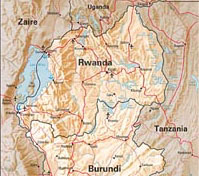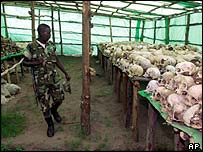 |
an item posted below on the upcoming 10th anniversary remembrance of the death of Nirvana lead singer Kurt Cobain — Michael wonders why it is that the almost exclusive media focus on the history of a decade ago centres on the death of a rock musician, to the exclusion of a remembrance and reflection on the mass genocide which took place in the tiny Central African country of Rwanda, around the same time of Cobain’s passing.
 800,000 people were killed in the Rwandan holocaust |
In 1994, one of the most appallingly intensive killing campaigns in human history — possibly the most intensive — took place in 100 days of genocide that the outside world did little to prevent. Many of the majority Hutu (about 85% of the population) turned on the Tutsi (about 12% of the population) and moderate Hutu, killing an estimated 800,000 people.
Gendercide provides this case study on the Rwandan holocaust, while BBC News publishes this report on the more than 100,000 genocide suspects who remain in Rwandan jails awaiting trial.
Update: Sent in by reader Alison Fitch, this story from the Globe and Mail, a feature on how the Hutus tortured Athanasie Mukarwego’s husband to death and then told her: “You, we will kill with rape.” For the three horrific months that followed, literally hundreds of them tried to do just that. As Rwanda prepares to mark the genocide’s 10th anniversary, she can’t forget but “I have to forgive, so things are different for my children.”
Also, in production, The Guardian reports that filmmaker Raoul Peck’s Sometimes in April has set out to “recreate the killing zones to reach beyond cliche of ‘never again’.”
it is a very sad commentary on our society that this story gets so little coverage. as i reflect, i feel guilty for musing about solitude but not commenting on the tutsi victims. it is similar to the plight of biafrans years earlier. it seems we learned nothing from biafra and will learn nothing from rawanda.